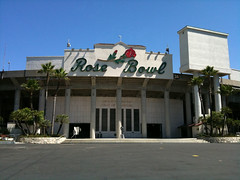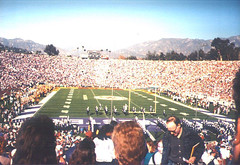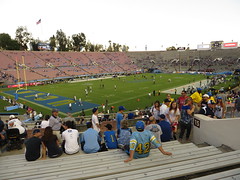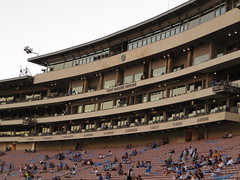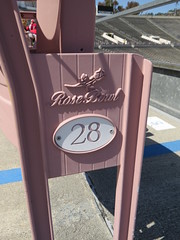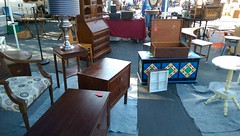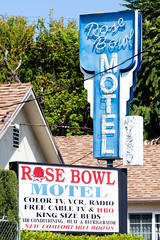Rose Bowl
The Rose Bowl is an outdoor athletic stadium located in Pasadena, California. Opened in October 1922, the stadium is recognized as a National Historic Landmark and a California Historic Civil Engineering landmark. At a modern capacity of an all-seated configuration at 92,542, the Rose Bowl is the 16th-largest stadium in the world, the 11th-largest stadium in the United States, and the 10th-largest NCAA stadium. The stadium is 10 miles northeast of downtown Los Angeles.
One of the most famous venues in sporting history, the Rose Bowl is best known as a college football venue, specifically as the host of the annual Rose Bowl Game for which it is named. Since 1982, it has served as the home stadium of the UCLA Bruins football team. Five Super Bowl games, third most of any venue, have been played in the stadium. The Rose Bowl is a noted soccer venue, having hosted the 1994 FIFA World Cup Final, 1999 FIFA Women's World Cup Final, and the 1984 Olympic Soccer Gold Medal Match, as well as numerous CONCACAF and United States Soccer Federation matches.
The stadium and adjacent Brookside Golf and Country Club are owned by the city of Pasadena and managed by the Rose Bowl Operating Company, a non-profit organization whose board is selected by council members of the city of Pasadena. UCLA and the Pasadena Tournament of Roses also have one member on the company board. The Chief Executive Officer and General Manager was Darryl Dunn from 1999 until he retired in June 2022.
History
Design and construction
Through January 1922, the bowl now known as the Rose Bowl Game was played at Tournament Park, about southeast, adjacent to the campus of the California Institute of Technology (Caltech). The Pasadena Tournament of Roses Association, the game's organizer, realized the temporary stands were inadequate for a crowd of more than 40,000, and sought to build a better, permanent stadium.
The stadium was designed by architect Myron Hunt in 1921. His design was influenced by the Yale Bowl in New Haven, Connecticut, which opened in 1914. The Arroyo Seco was selected as the location for the stadium. The Rose Bowl was under construction from Feb. 27, 1922 to October 1922. The nearby Los Angeles Memorial Coliseum also was under construction during this time and would be completed in May 1923, shortly after the Rose Bowl was completed. Originally built as a horseshoe, the stadium was expanded several times. The southern stands were completed in 1928, enclosing the stadium into a complete bowl.
The field's alignment is nearly north–south, offset slightly northwest, and the elevation at street level is approximately above sea level.
The stadium's name was alternatively "Tournament of Roses Stadium" or "Tournament of Roses Bowl", until being settled as "Rose Bowl" before the 1923 Rose Bowl game, in reference to the unusually named (at the time) Yale Bowl.
The stadium can be very difficult to access due to the traffic caused by single-lane residential street access. It has little dedicated parking for visitors and parking issues have routinely caused visitors to spend two to three hours completing the last mile to the stadium on game days. When constructed, the majority of visitors arrived to the bowl via the Pacific Electric interurban streetcar system; however, this service ended in 1958. Weather permitting the 36 holes of Brookside Golf Course are used for parking. In 2016, Rose Bowl contracted ParkJockey to streamline parking in and around the stadium. There is improved signage, shuttle service to help visitors get to the stadium and mobile lighting powered by generators to provide visibility for people walking on the golf course at night.
Dedication
The first game was a regular season contest in 1922, when California defeated USC on October 28. This was the only loss for USC and Cal finished the season undefeated. California declined the invitation to the 1923 Rose Bowl game and USC went instead. The stadium was dedicated officially on January 1, 1923, when USC defeated Penn State
Seating
The stadium seating has been reconfigured several times since its construction in 1922. The South end was filled in to complete the bowl and more seats have been added. The original wooden benches were replaced by aluminum benches in 1969. All new grandstand and loge seats had been installed since 1971. New red seat backs had been added on 22,000 seats prior to the 1980 Rose Bowl. A Rose Bowl improvement was conducted because of UCLA's 1982 move and the 1984 Summer Olympics. This resulted in new seat backs for 50,000 seats.
For many years, the Rose Bowl had the largest football stadium capacity in the United States, eventually being surpassed by Michigan Stadium (107,601). The Rose Bowl's maximum stated seating capacity was 104,091 from 1972 to 1997. Some of the seats closest to the field were never used during this time for UCLA regular season games, and were covered by tarps. Official capacity was lowered following the 1998 Rose Bowl. Slightly different figures are given for the current capacity, for the lower-level seats behind the team benches are not used for some events since the spectators can not see through the standing players or others on the field. UCLA reports the capacity at 91,136. The Tournament of Roses reports the capacity at 92,542. The 2006 Rose Bowl game, which was also the BCS championship game, had a crowd of 93,986. In the 2011 contest between TCU and Wisconsin, the listed attendance is 94,118. As of 2008, the Rose Bowl is the 11th largest football stadium, and is still the largest stadium that hosts post-season bowl games. For concerts held there, the Rose Bowl holds almost 60,000 people. The stadium's 2014 remodeling removed the lower "lettered row" seats on each side behind the players' benches and provided access in and out of the stadium for the lower sections of the Rose Bowl, restoring its original design.
For the 2021 season, UCLA began using a tarp to decrease capacity and cover the north upper end zone, the tarp spells out U-C-L-A with advertisements on the side. This brought official capacity down to 69,747 seats.
Renovations
The press box was updated before the 1962 Rose Bowl with an elevator and two rows. The cost was $356,000. The Press Box was refurbished for UCLA's move in 1982 and the 1984 Summer Olympics. In 2011 and 2012, the press box was undergoing renovation as part of the larger renovation originally budgeted at $152 million in 2010. Costs had increased to $170 million during construction. Work proceeded during the 2011 football season, and was expected to be completed before the UCLA Bruins' first home game in 2012. Some unforeseen problems had been encountered due to the stadium's age and some renovations done in the early 1990s. Most of the planned renovations were completed in 2013. Because of the increased construction cost, items deferred for the future are additional new restrooms, the historic field hedge, new entry-gate structures, ribbon boards & additional new concession stands. The stadium has started "The Brick Campaign" to help pay for some of the cost of the renovations. The Brick Campaign, completed in 2014, features a large logo of the Pasadena Tournament of Roses and the donor bricks arranged by universities in front of the south main entrance to the stadium. A large tall by wide LED video display board was added to the north end of the stadium as a part of the renovation.
Court of Champions and Rose Plaza
The Court of Champions is at the stadium's south end. Rose Bowl game records along with the names of the coaches and the MVP players, are shown on the plaques attached to the exterior wall. The Hall of Fame statue is also at the Court of Champions. The 2014 renovation allows more plaques to be placed on the wall and floor for future games. The statue of Jackie Robinson, who played football with Pasadena City College, was dedicated in 2017. In 2019, Brandi Chastain's statue was added outside of the south gate. The statue portrays Brandi in her celebration of her winning penalty kick in the 1999 FIFA Women's World Cup final, where she exposed her sports bra after removing her jersey. The image of her celebration was described in The New York Times as "most iconic photograph ever taken of a female athlete", and it has been considered one of the more famous photographs of a woman celebrating an athletic victory. A statue to honor Keith Jackson, the longtime ABC broadcaster who had called many games from the Rose Bowl, was unveiled on December 14, 2019, at the stadium's Rose Plaza. The commemorative bricks are located in front of Gate A. There are sections reserved for the City of Pasadena, Tournament of Roses, Rose Bowl, and each school of the Pac-12 and Big Ten conferences.
Terry Donahue Pavilion
The seven-story Terry Donahue Pavilion is named for the former UCLA football head coach, who was the most successful coach in UCLA and Pac-12 history. It houses the press boxes, broadcast booths, premium seating, boxes and suites. There are 54 luxury suites, 48 loge boxes, 1,200 club seats, state-of-the-art press boxes and a new broadcast center. The previous press box was replaced by a new self-contained media area capable of accommodating 318 credentialed working press facility along with a separate level dedicated to game day operations, including TV and radio broadcasting, instant replay booths, coaching staffs and an emergency command center. The radio and TV booths were renamed "The Keith Jackson Broadcast Center" in December 2015. Jackson, the former ABC-TV sportscaster, coined the phrase "The Granddaddy of Them All" for the Rose Bowl game.
1922 Locker Room Museum
The old 1922 Rose Bowl locker room was restored in 2017 and converted into a little museum. Sections are dedicated to the construction of the Rose Bowl, the Rose Bowl games, UCLA football, and the NFL Super Bowl games played at the Rose Bowl.
Venue rankings
In 1999, Sports Illustrated listed the Rose Bowl at number 20 in the Top 20 Venues of the 20th…
Looking for places related to Rose Bowl?
Those are other destinations to find places related to Rose Bowl:
- Rose Bowl
- Huntington Library
- Pasadena City Hall
- Arroyo Seco
- Norton Simon Museum
- Millard
- Jet Propulsion Labo…
- Americana at Brand
- Fuller Theological …
- Neutra VDL Studio a…
- Bungalow Heaven, Pa…
- All Saints Episcopa…
- Heritage Square Mus…
- Cottage Court
- Crescenta Valley
- Hale
- Atwater Avenue Elem…
- Alhambra High School
- Cawston Ostrich Farm
- California Institut…
- Alex Theatre
- Arroyo Seco bicycle…
- Andrew McNally
- Civic Center Financ…

